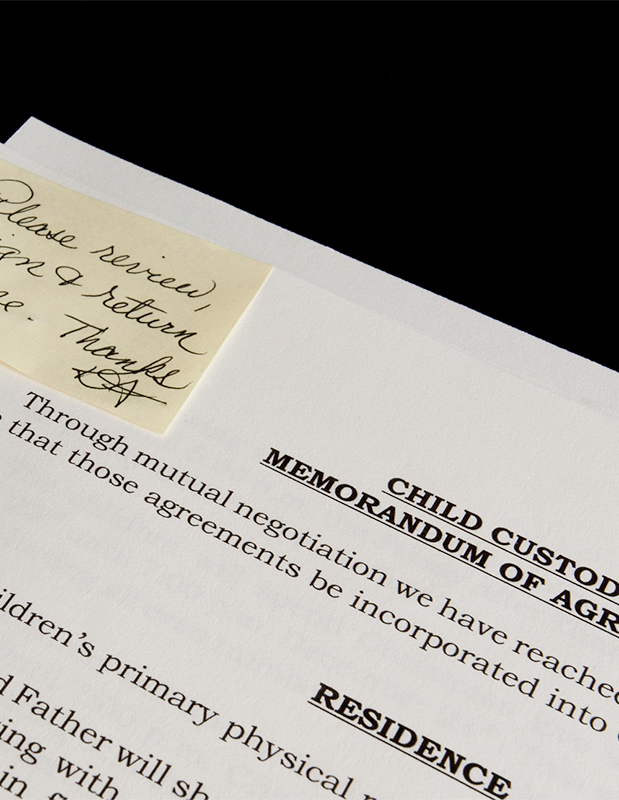CHILD CUSTODY
In North Carolina, child custody and child support matters are separate legal issues. Custody laws govern the physical control and care of children, and sometimes, dependent adults. Child support, on the other hand, governs the financial obligations parents have for their children whether the parents were ever married and irrespective of whether the parent has daily contact with the child.
North Carolina law tends to encourage agreement on issues of custody. Mediation is frequently a mandatory part of any custody or child support litigation. Frequently parents reach agreements on custody and child support in mediation. There are several types of custody arrangements that the parties might agree to including:
- Joint physical and legal custody – Both parents share substantial and frequently almost equal time with their children. They share information jointly make decisions regarding the education, health and welfare of the child.
- Sole physical and legal custody – The child lives with one parent and that parent makes decisions regarding the education, health and welfare of the child without input from the other parent. The other parent may or may not have visitation.
- Primary physical and legal custody – The child resides the majority of the time with one parent and secondarily with the other. Both parents share information and jointly make decisions regarding the education, health and welfare of the child.
However, some families encounter issues so overwhelming that they are unable to agree and a trial on these issues becomes necessary. These issues commonly include a change in one parent’s location or working hours, a parent’s lifestyle choices following divorce, domestic violence, anger management, addictions and mental illness. A judge will consider a variety of factors at trial including the evidence presented and the court’s perspective relative to the best interest of your children. Based on these and other factors, courts award custody and visitation as well as the permanence of such rulings.
As with all issues surrounding divorce, mediation and creative problem-solving provide parents the strongest opportunity to create solutions to provide for the best interests of the children. When parents cannot find common ground with respect to the support and custody of their children, the family law attorneys at NicholsonPham are trial lawyers.
Emergency Orders
In rare circumstances, it may be necessary to ask a judge to enter an emergency order to protect the safety of the minor children or to prevent the other party from taking the children out of the area without your consent. If you believe you need an emergency order, please call and make an appointment to consult with an attorney at NicholsonPham as soon as possible.
CUSTODY FAQs
 Call: (919) 883-4900
Call: (919) 883-4900
CUSTODY AGREEMENTS

A custody agreement can be as complex or as simple as you want to make it. The main issues to think about are:
- What’s best for my kids?
- What’s going to work for me?
- What will the other parent/party agree to?
A number of factors are in play – personal safety for your children, ease of transition, possibility of moving far away, and any special needs of your kids. When you work with one of our attorneys to come up with a custody agreement, these are the types of questions we’ll be asking:
- Do you prefer 50/50 time, a 2-2-3 schedule or a week on/week off schedule? There are many ways to sharecustodial time. Does one parent have a work schedule that is more conducive to having weekday nights or weekends?
- How do you want to handle holidays or school breaks?
- Access during non-custody times: will the children be able to call the other parent? Skype? Text? How often? Any limits on this?
- Another typical section of a parenting agreement consists of “what happens when things go wrong” or when modifications are necessary.
- Removal of the children from the state/country. Do you want to know about it ahead of time/have the opportunity not to approve?
- Relocation of either party from the area …. How far is too far? What happens if you get a great job offer in Oklahoma?
- Any concerns about parental behavior with drugs/alcohol?
- What about your ex having someone over to spend the night?
- Taxes: Dependency exemption – will the parties share this?
- How much do the children spend on extracurricular activities, camps, track-outs or intersessions, after school care? These things add up – who will pay for them?
CHILD SUPPORT
In North Carolina child support is governed by the North Carolina Child Support Guidelines. In general, these guidelines are considered fair though a court will consider factors that might result in deviations from the guidelines. In child support, as in all other areas of your divorce, the court has discretion to provide a different award when necessary and when in the best interest of the child.
North Carolina has adopted Child Support Guidelines which help parties and judges come up with guideline amounts of how much each party should have to pay, based on:
- The income of each party
- The number of nights the child(ren) spends with each party
- How many children there are
- Health insurance costs for the child(ren)
- Other expenses for the child(ren)
If you know how much you make per month and can calculate the other party’s monthly gross income, we recommend you start with this guideline calculator: https://nddhacts01.dhhs.state.nc.us/WorkSheet.jsp
Parties don’t have to go to court to get child support, if they can agree on an amount. Child support agreements should be in writing to protect both parties and the attorneys at NicholsonPham can advise you and draft those agreements.
